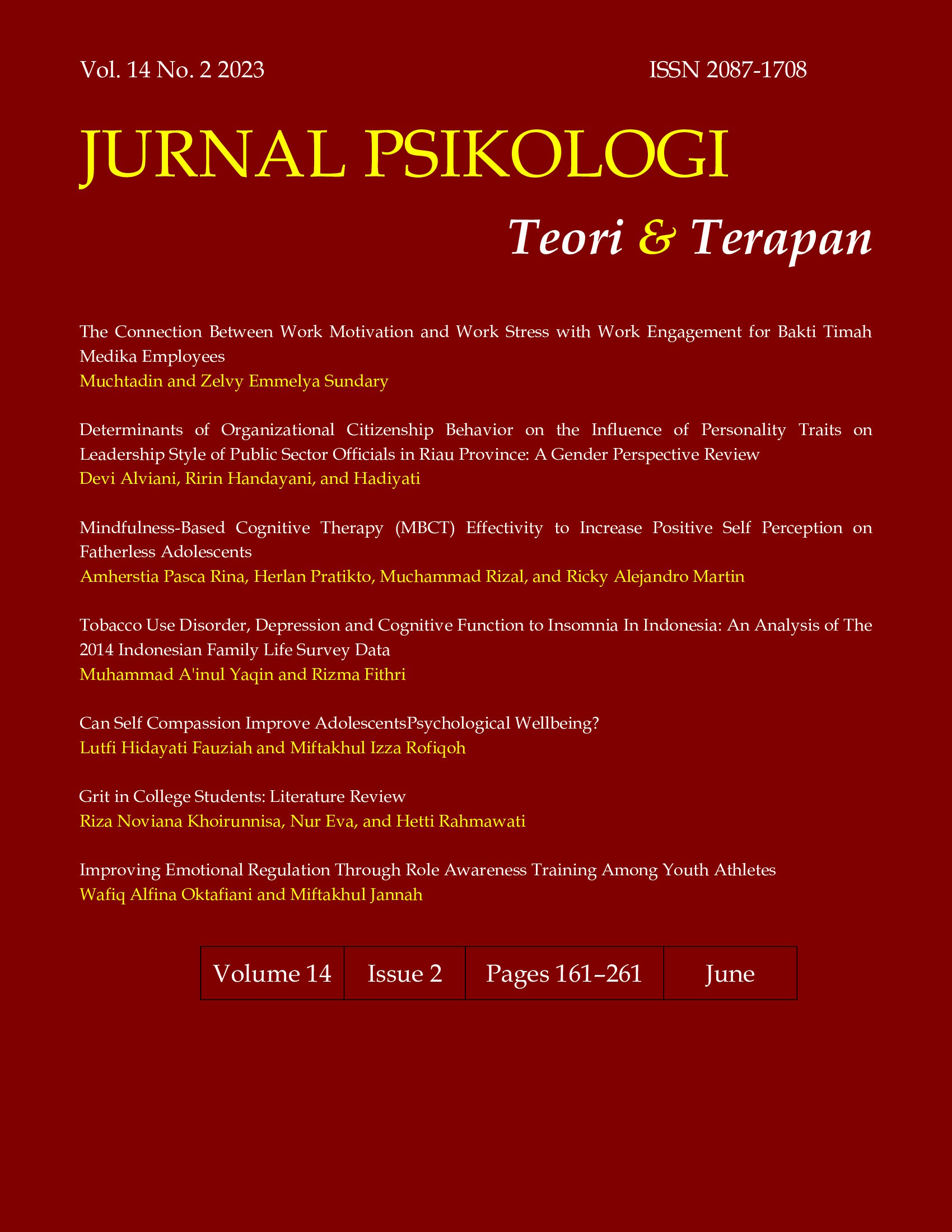The Connection Between Work Motivation and Work Stress with Work Engagement for Bakti Timah Medika Employees
DOI:
https://doi.org/10.26740/jptt.v14n2.p161-173Keywords:
job stress, work engagement, work motivation, keterlibatan kerja, motivasi kerja, strAbstract
This research aims to determine the strength of the relationship between motivation and work stress with work involvement individually or simultaneously. The quantitative approach used in research. The sampling used is the saturated sample method. A total of 270 people filled out the questionnaire with a response rate of 17.21% of the total population. The data analysis method used quantitative descriptive analysis, simple correlation, and multiple correlation. Normality and linearity tests were used before hypothesis testing. The finding in this study is that work motivation is positively and strongly correlated with work engagement. Job stressor has a negative and weak correlation with work engagement. Motivation and work stress are simultaneously positively connected with work engagement. The company is expected to provide motivation, increase the benefits provided and provide freedom in managing work schedules and ways of working so that employees feel more comfortable with their work. Further researchers can use factors that mediate the link between job stress and job engagement to explain the weak relationship found in this study. The next researcher can compare work motivation, job stress and job involvement
Penelitian ini bertujuan untuk mengetahui kekuatan hubungan motivasi dan juga stres bekerja dengan work engagement secara masing-masing maupun simultan. Pendekatan kuantitatif dipakai dalam penelitian. Pengambilan sampel yang dipakai ialah metode sampel jenuh. Sebanyak 270 orang yang mengisi kuesioner dengan tingkat respon 17,21% dari total populasi. Metode analisis data memakai analisis deskriptif kuantitatif, korelasi sederhana dan korelasi berganda. Uji normalitas dan linearitas dipakai sebelum pengujian hipotesis. Temuan dalam penelitian ini ialah motivasi kerja berkorelasi positif dan kuat dengan work engagement. Stres kerja berkorelasi negatif dan lemah dengan work engagement. Motivasi dan stres kerja secara berbarengan berkorelasi positif dengan work engagement. Pihak perusahaan diharapkan memberikan pelatihan motivasi, meningkatkan tunjangan yang diberikan serta memberikan kebebasan dalam mengatur jadwal kerja dan cara bekerja agar karyawan lebih merasa terikat dengan pekerjaannya. Peneliti selanjutnya dapat menggunakan faktor yang memediasi hubungan antara stres kerja dengan work engagement guna menjelaskan lemahnya hubungan yang ditemukan dalam penelitian ini. Peneliti selanjutnya bisa juga membandingkan tingkat motivasi kerja, stres kerja dan work engagement pada karyawan yang memiliki posisi pekerjaan yang berbeda.
References
Asif, M., Qing, M., Hwang, J., & Shi, H. (2019). Ethical leadership, affective commitment, work engagement, and creativity: Testing a multiple mediation approach. Sustainability (Switzerland), 11(16). https://doi.org/10.3390/su11164489
Kristiana, I. F., Fajrianthi, F., & Purwono, U. (2019). Analisis Rasch Dalam Utrecht Work Engagement Scale-9 (Uwes-9) Versi Bahasa Indonesia. Jurnal Psikologi, 17(2), 204. https://doi.org/10.14710/jp.17.2.204-217
Pradnyani, G. A. A. I., Rahmawati, P. I., & Suci, N. M. (2020). Pengaruh Reward Dan Punishment Terhadap Motivasi Kerja Karyawan Pada Cv Ayudya Tabanan Bali. Prospek: Jurnal Manajemen Dan Bisnis, 2(1), 21. https://doi.org/10.23887/pjmb.v2i1.26186
Saputra, N. (2018). Does Learning Culture Impact Directly or Indirectly on Work Engagement in the Indonesia Oil Palm Industry? International Journal of Engineering & Technology, 7(3.30), 561. https://doi.org/10.14419/ijet.v7i3.30.18431
Shukla, A., & Srivastava, R. (2016). Development of short questionnaire to measure an extended set of role expectation conflict, coworker support and work-life balance: The new job stress scale. Cogent Business and Management, 3(1). https://doi.org/10.1080/23311975.2015.1134034
Sihombing, A. O., & Bangun, R. H. (2019). Analisis Korelasi Sektor Pertanian Terhadap Tingkat Kemiskinan di Provinsi Sumatera Utara. Jurnal Agrica, 12(1), 17. https://doi.org/10.31289/agrica.v12i1.2220
Xu, L., Wang, Z., Li, Z., Lin, Y., Wang, J., Wu, Y., & Tang, J. (2022). Mediation role of work motivation and job satisfaction between work-related basic need satisfaction and work engagement among doctors in China: a cross-sectional study. BMJ Open, 12(10), e060599. https://doi.org/10.1136/bmjopen-2021-060599
Downloads
Published
How to Cite
Issue
Section
License

This work is licensed under a Creative Commons Attribution-NonCommercial 4.0 International License.
Authors who publish in this journal agree to the following terms:
Copyright in any article is held by the author.
The author grants the journal, publication rights with the work simultaneously licensed under a Creative Commons Attribution License that allows others to share the work with an acknowledgment of the work's authorship and initial publication in this journal.
Authors may enter into separate, additional contractual arrangements for the non-exclusive distribution of the journal's published version of the work (e.g., posting it to an institutional repository or publishing it in a book), with an acknowledgment of its initial publication in this journal.
Authors are permitted and encouraged to post their work online (e.g., in an institutional repository or on their website) prior to and during the submission process, as this can lead to productive exchanges, as well as earlier and greater citation of published work.
 Abstract views: 1300
,
Abstract views: 1300
, PDF Downloads: 876
PDF Downloads: 876


















